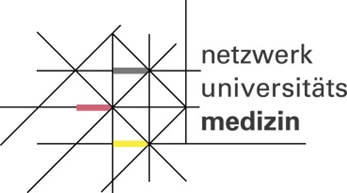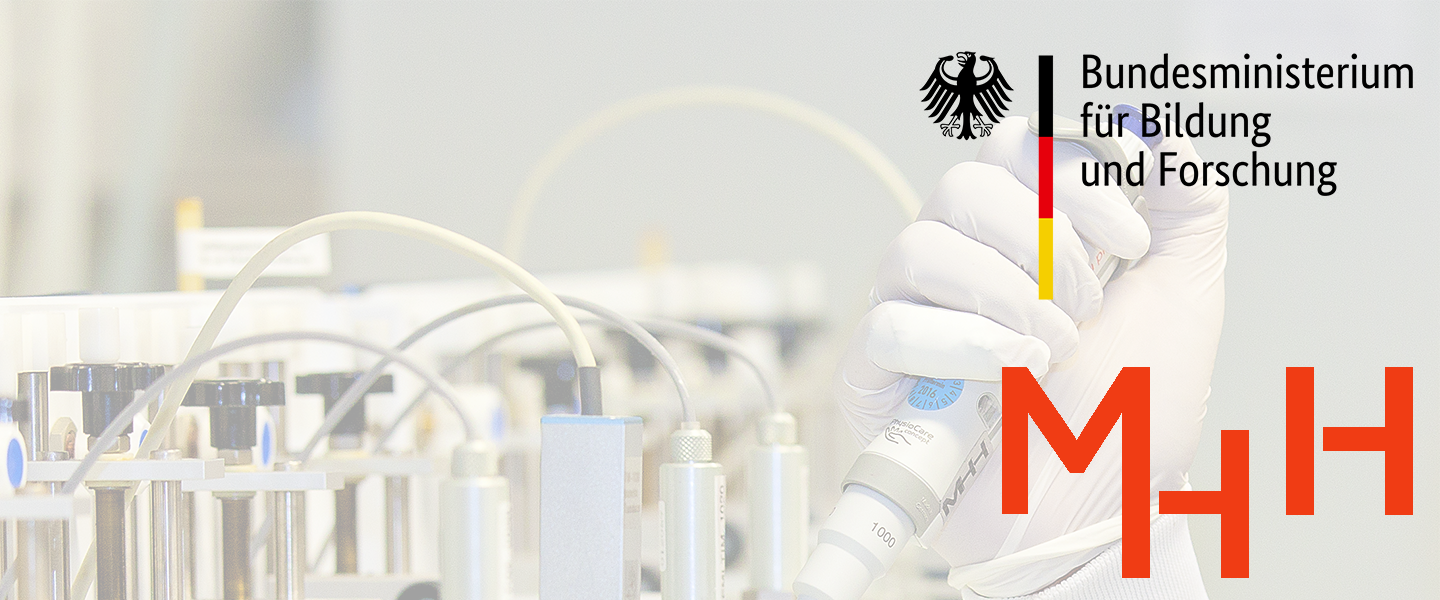Funded by the Federal Ministry of Education and Research (BMBF)
Network of University Medicine (NUM)

Providing patients with optimal care, preventing infections and expanding healthcare is the mission statement of the Network of University Medicine (NUM), founded in spring 2020. The network is currently coordinating research activities to tackle the COVID-19 pandemic and develop new strategies for action. Funded by the Federal Ministry of Education and Research and coordinated by Charité - Universitätsmedizin Berlin, the research network is working on solutions to improve patient care and pandemic preparedness. All 36 German university medical centres as well as other partners are participating in the network.
Among other, the network focuses on clinical and healthcare research, which directly benefits patients, affects crisis management and helps to establish a national research infrastructure. To realise this task, the NUM and the participating institutions will be provided with up to 390 million euros for collaborative projects by mid-2025. In the medium term, the aim is to utilise the created structures and concepts to research other diseases and to improve cooperative research in university medicine in general.
Further information: https://www.netzwerk-universitaetsmedizin.de
Projects Network of University Medicine
Overview 1. funding period (2020-2021) Overview 2. funding period (2022-2025)
More projects
Department / Institute: Helmholtz Centre for Infections Research (HZI) - Dept. of Epidemiology
Among the biggest challenges in the COVID-19 outbreak are the lack of triangulation of clinical, epidemiologic and immunological information for evidence-based response strategies. The consortium CORESMA combines an accelerated ad-hoc outbreak response to address the urgency and a sustainable strategy to serve beyond the current public health threat from COVID-19. Our approach is innovative in combining unique mHealth technology, multiplex serolomics, state of the art modelling, artificial intelligence and implementation research, also applying them to particularly vulnerable countries outside Europe.
CORESMA aims to immediately generate the most needed clinical and epidemiological data required for defining targeted public health measures at national and global level, early enough to become effective during this outbreak. Furthermore, the consortium intends to develop and establish tools and methodologies to improve the global public health preparedness for outbreaks emerging in the future.
Department / Institute: HTTG / LEBAO
So far, mainly immortalized cell lines or primary material with limited access have been used to investigate host-virus interactions in SARS-CoV-2 infections. To identify drug targets or to explore potential toxic effects of anti-virals, alternative human airway models are required. In this project we aim to advance human induced pluripotent stem cells (hiPSC) derived respiratory epithelial cultures for use as an innovative in vitro infection model. Targeted differentiation protocols are used to generate proximal and distal respiratory epithelium from hiPSCs. CRISPR/Cas9 based gene editing will be applied to knock out NRF2, which induces a major cytoprotective program and is the key target of planned investigations. Air-liquid interface cultures differentiated from KO and WT hiPSC lines will be used to investigate NRF2 signaling and resulting cytoprotective effects in respiratory epithelium during SARS-CoV-2 infections, and to assess the ability of Nrf2 activating pharmacological interventions to reduce cytopathic effects and infectivity of SARS-CoV-2.
Department / Institute: Department of Respiratory Medicine and Infectious Diseases
Respiratory diseases are among the leading causes of morbidity and mortality worldwide. Auscultation ("listening") of the lungs using a stethoscope is an important method of diagnosis but is prone to inaccuracies as it is based on subjective interpretation.
The DigitaLung project aims to improve the objectivity of diagnosis by utilizing advanced machine learning methods. As part of the project, a multi-centre study is conducted to build a large and well-classified database of lung sounds, which in turn is used to develop and validate a digital auscultation system. In the future, the system will support general practitioners conducting differential diagnosis and be utilized in telemedicine.
The project focuses on diseases such as bronchitis and pneumonia, improved diagnostics and therapy management of asthma, COPD, pulmonary emphysema, pulmonary fibrosis and the follow-up of late fibrotic damage in COVID-19 patients.
DigitaLung is part of the project "Medizintechnische Lösungen für eine digitale Gesundheitsversorgung " funded by the Federal Ministry of Education and Research.
Department / Institute: Department of Pneumology
Randomized, doubleblind, multicentre Phase-II study of Granulocyte macrophage colony stimulating factor (GMCSF) inhalation for prevention of ARDS in COVID-19 pneumonia (EudraCT-No.: 2020-001654-21)
Department / Institute: Hannover Unified Biobank (HUB)
In order to be able to determine the actual spread of the SARS-CoV-2 virus, it is possible to test the blood serum for antibodies against SARS-CoV-2. These antibodies are formed a short time after infection by the human immune system and remain in the body even after the disease, and can thus react faster and better to the virus in the event of a renewed infection and thus presumably ensure immunity. How long the immunity lasts is still unclear and will be found out with the help of this study.
In cooperation with the Hanover Unified Biobank (HUB), the central biobank of the MHH, and various partners from research, emergency services and health authorities, the Helmholtz Center for Infection Research GmbH conducts targeted field studies on seroprevalence in populations that are selected according to epidemiological criteria. The aim is to create measures for immediate risk assessment and evidence of measures to combat the COVID-19 pandemic.
Department / Institute: Helmholtz Centre for Infections Research (HZI) - Dept. of Epidemiology
The aim of the study is to estimate the regional seroprevalence of COVID-19 in different counties in Germany where the potential seroprevalence reaches 2%, assuming twice the number of reported cases. In July 2020, we started the successive cross-sectional study with serologic assays to detect specific antibodies to SARS-CoV-2 virus in regional population-representative samples (n= 1500-3000 persons aged 18 years and older) in eight counties with varying levels of epidemic activity. Recruitment is made through samples drawn from population registration offices.
Home visits will be offered to individuals at increased risk for severe disease progression or acutely ill with COVID-19. After 4 months, participants will be invited again to examine the evolution of antibody occurrence and immunity in the population over time. At the study sites, study teams will conduct blood draws and surveys, adhering to the rules of informed and written consent.
In total, we will have up to 50,000 samples from 8 counties.
Department / Institute: Clinic for Rheumatology and Immunology
Protecting migrant healthcare workers (HCWs) is an important dimension of pandemic preparedness. This pilot project introduces a ‘syndemic’ approach to COVID-19 with a focus on higher-skilled personnel; it connects health policy/system and actor-centred approaches. The study draws on survey data gathered at the Hannover Medical School as well as in-depth qualitative research with Romanian physicians in Germany to investigates perceptions and needs of migrant HCWs and to explore policy solutions. It aims to improve migrant HCW protection and contribute to effective health workforce policy and European/global responses to HCW shortage and resilience.
PROTECT is part of the German Alliance for Global Health Research (GLOHRA) and receives funding from the German Federal Ministry for Education and Research (BMBF). It is a collaboration between the Hannover Medical School (Germany), University Medicine Göttingen (Germany), and School of Public Health at the Babeș-Bolyai University Cluj-Napoca (Romania). The project started May 2022 and will continue until April 2023.
Further information can be found on the websites of GLOHRA and the Hannover Medical School.
Department / Institute: CCC Hannover (Claudia von Schilling-Zentrum)
Decision making on cancer care during the COVID-19 pandemic is characterized not only by limited resources and prioritizations of acute treatments, but also by multidimensional implications for treatment algorithms, long-term outcomes and clinical process management. This has to be considered during all phases of the pandemic progression: 0) regular treatment before the pandemic; 1) prevention of the spread and preparation for infected individuals; 2) resource scarcity, and 3) re-establishment of regular treatment routines. The complexity of cancer care requires specific considerations of ethical and medico-legal aspects, but currently such guidelines are only available for intensive/ emergency care. This project aims to develop data-based decisional guidelines for oncology care under the context of pandemics. Stakeholder perspectives will be assessed by specific questionnaires. Clinical data, data regarding oncology-specific critical resource availability and selected economic data will be used for modelling consequences in terms of morbidity development and disease-related outcome.
https://www.mhh.de/ccc-hannover-claudia-von-schilling-zentrum/forschung-und-wissenschaft
Department / Institute: Clinic for Pediatric Pneumology, Allergology and Neonatology
Prospective monthly estimate of the seroprevalence of the infection with SARS-CoV-2 in children in Germany in the period from 1st May 2020 to 30st April 2021 in 12 sentinel children's hospitals.
Objectives of the study are:
- Description of the course of the epidemic in children in Germany.
- Assessment of the impact of region, age, sex, all the temporal course of the epidemic.
- Estimation of the burden of suffering by comparing frequency and severity of respiratory infections in children with and without SAR-CoV-2 antibodies.
- Assessment of the association of underlying diseases to the burden of suffering. It is planned to recruit 1300 children up to 18 years of age per month (per Sentinel Children's Hospital approx. n=110). Serum samples taken as part of routine blood collection during inpatient or outpatient treatment and data of a parental questionnaire are collected. In this cooperation project, the children's hospital of the MHH is one of the 12 recruiting sentinel children's hospitals.
Department / Institute: Department of Plastic, Aesthetic, Hand & Reconstructive Surgery
Current therapeutic options of SARS-CoV2 infection are limited and lack specificity and effectivity. We suggest to generate modified, synthetic SARS-CoV2 viruses, with targeted therapeutic agents such as RNA snippets to deactivate regular viral translation via inverse mRNA silencing and shRNA, as well as inhibition of viral proliferation through transcription of inhibiting proteins. Vectors with targeted RdRp-inhibiting RNA will additionally inhibit virus- specific RNA transcription. Effectivity of the viral vectors will be tested in-vitro. For the pre-clinical validation, a SARS-CoV2 infection model of human airway and alveolar endothelial cells will be established in a lung-on-a-chip model (COVID-19-on-a-chip). Within this model, successful attenuation of the viral infection through transfection with the modified virus will be determined. If successful, this approach would allow treatment of COVID19 patients and offer a platform for adaption to different viral infections.
